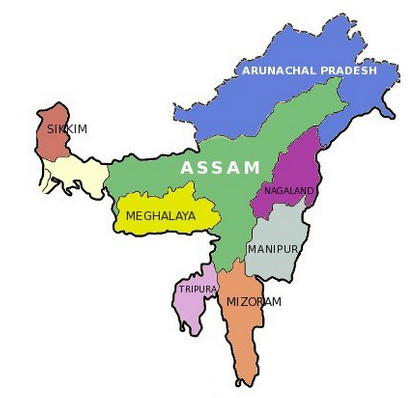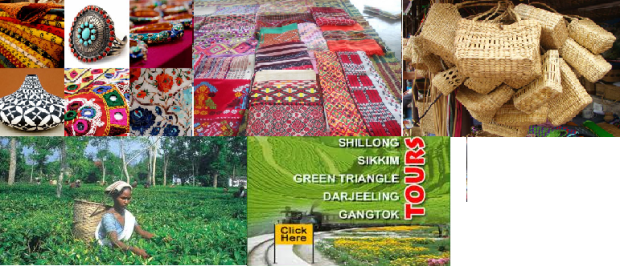North East India: Emerging market trends and Entrepreneurs
-Yatharth Varma
North East India comprising of seven sister states or sunrise states have long been unable to keep pace with the development happening in the rest of the country. It has been neglected in terms of both economic and social development. Cultural conflicts, geographical isolation, militarization, migration are some of the many social issues that have prevented business and enterprise ventures in this part of the country.
The region has been suffering from ethnic violence for decades and being situated in geo-political location it becomes difficult for people to exercise their entrepreneurial decisions. Factors such as armed conflicts, poverty, unemployment and gender based violence make the society weak and oppressed. These factors have actually created a need to devise long term sustainable solutions for the growth of this region.
But there has been a silver lining and ray of hope always in terms of rich natural resources, culture of art and handicraft, skilled manpower in the north eastern states which have slowly developed interest with respect to business practices, marketing trends and initiatives. There is a need for proper education and awareness about the opportunities that surround them among the local people and motivated youth can help solve this problem by being the facilitators of knowledge. There have been several attempts by the Government and Planning Commission to enhance the local development. The government is allocating huge amounts of funds every year for its development in infrastructure and other facilities necessary for its progress. North East India is endowed with vast number of resources which, if put into use judiciously by encouraging micro level rural entrepreneurship and integrating it with local as well as international markets, can provide employment to all and also guarantee better living conditions. The communities must be organized as an enterprise, have knowledge about the latest technology and skills needed for that particular industry. This provided with regular and monitored funding can help flourish local and international market.
Ongoing Efforts
Business and social entrepreneurs are taking lead in building enterprises which involves the local community. Pranjal Baruah’s Mushroom Development Foundation works closely with mushroom farmers in Assam, putting them in control of their produce through his land-to-lab strategies, training and support and creating mushroom entrepreneurs. He is creating livelihood opportunities for thousands of unemployed youth and landless farmers in Assam and also developing a whole new market for mushroom consumption. Another such initiative is medicinal plants that grow are made into products. We have started a bamboo processing unit for incense sticks makers,” says Joseph Lalngaihawma Ralte, managing director, Malsom Bamboo and co-founder of the Mizo Entrepreneur Network (MEN). Ralte and MEN’s co-founder Daniel Hauhnar, who runs Zokrafts Bamboo, do similar work: they process the abundantly growing bamboo in these regions into sticks, which are sent to Bangalore for making incense sticks. Another traditional activity common across the region is handloom weaving. Mizoram Apex Handloom and Handicraft Cooperative Society (MAHCO) want to expand outside local market and encourage women to take it up. There are an estimated 1,000 handloom weaving units in Mizoram. The largest unit has 50 looms, with one unit on average manufacturing 15 meters of fabric a day. With weaving being the second largest economic activity in Assam, Rakhee and another rising entrepreneur, organizes women weavers into cooperatives, connecting them directly to the market. She builds entrepreneurial skills in these women, and encourages them to deliver quality products to the market.
Entrepreneurs Associates (EA), a microfinance unit in Kohima, Nagaland, set up by Neichute Doulo has begun to ensure that the small entrepreneur repays his loan so that they can lend again to others. This is a culture that needs developing, Doulo too maintains. Theja Meru, an entrepreneur in Kohima whose Dream Cafe is a popular coffee bar in the central market, is now setting up a heritage hotel at DC’s Bunglow where the British Indian army held back advancing Japanese troops during World War II.
There is no limit to opportunities when it comes to setting up rural enterprise in North-East. There are huge species of ornamental fishes and scope for expansion of floriculture, rubber plantations, mushroom cultivation and handloom industries. North-East India has a huge capacity of hydro-electricity projects which if tapped, can be used to satisfy one third of India’s power requirement. The vast amount of coal, petroleum and natural gas reserves also exist in the region. Almost all states share border with other countries providing scope for trade through land.
Confederation of Indian Industry (CII) is taking multidimensional initiatives in close partnership with the Ministry of Development of North Eastern Region (DoNER), State Governments, institutions and industry with the objective of mainstreaming the North Eastern Region, infusing sustained and equitable growth, setting up growth engines and accelerating economic and social development in the Region. CII has identified select agro – commodities such as Rubber and Pineapple in Tripura and created multi-stakeholder platforms with the aim of promoting value additions and developing market linkages. Other agencies such as Small Industries Services Institutes (SISIs), North Eastern Industrial and Technical Consultancy Organisation (NEITCO), North Eastern Industrial Consultant (NECON), and National Small Industries Corporation (NSIC), Indian Institute of Entrepreneurship (IIE), a national institute at Guwahati act as catalyst on entrepreneurship development with its focus on the North East.
Established Brands
The region is emerging as an attraction for upscale apparel and accessories labels that are seeking to tap the growing demand in states such as Assam, Tripura and Manipur. From the makers of sports and fashion wear to jewelry, retailers are heading to the north-east either to open their first stores or expand their business. S. Oliver Fashion India Pvt. Ltd, which runs S. Oliver stores in India, has opened franchisees in cities such as Shillong, Guwahati and Siliguri. Louis Philippe, the men’s brand from Madura Garments that sells apparel, shoes and accessories, started test-marketing its range in the north-east with a store in Guwahati. Pleased with the results, it is looking at expanding. “We will look at more stores in Guwahati as well as at places that are further away,” said Bangalore-based Jacob John, brand director of Louis Philippe at Madura Garments, which has brands including Van Huesen and Peter England in its portfolio. Tanishq, the jewelry retail chain from the Tata-owned Titan Industries Ltd, has five stores in the region, in Guwahati and Agartala. “The north-east is one of the fashion capitals of the country,” said Dwaipyan Sen, brand manager (east) at Tanishq. “It is turning out to be a very important market for us in terms of demand for diamonds.” He calls it a future growth market. Titan Industries, which also sells watches and eyewear under the Titan and Fastrack brands, clocked sales of Rs.100 crore in the region last year, up from Rs.12-13 crore five years ago. Retailers are seeking to tap the demand in relatively unsaturated markets, eyeing new sources of revenue, after establishing themselves in the big cities. “It’s a brand-conscious and fashion-forward market. So it’s a natural progression for fashion brands to get there,” said Rachna Nath, leader of retail and consumer practice at PricewaterhouseCoopers. Growing incomes and rising purchasing power in urban areas of the north-east are pulling “consumers towards premium and branded products”, explained Pankaj Gupta, head of the consumer and retail practice at Tata Strategic Management Group consultancy. According to data provided by research agency Nielsen, the north-east accounts for 3.8% of India’s personal care market and is growing at a yearly pace of 22% —3 percentage points higher than the national average. “It is a big make-up market,” said Satyaki Ghosh, director of consumer products division at L’Oreal India Pvt. Ltd.
Consumer goods maker Dabur India Ltd has included Assam among its focus states in Project Double, an initiative under which it is seeking to double direct distribution to ensure higher market penetration. The firm, which markets Dabur Amla hair oil and Gulabari—a skin care product—believes “consumers in the northeast are highly evolved and their awareness levels on beauty care are particularly high,” said George Angelo, executive director, sales, Dabur India. New Delhi-based DLF Brands, which represents brands such as Forever 21, Mothercare and DKNY in India, will consider entering the north-east in the next one year, said Dipak Aggarwal, chief executive at the New Delhi-based firm.
Manish Agarwal, East Zone Head of Future Value retail Ltd. has already set up Big Bazar and Pantaloons outlets at Guwahati, Agartala, Darjeeling, Siliguri and Tinsukia.
Seeing the future prospects, big players in the retail sector are looking to consolidate their retail business in the region. The low rental values and price, and large availability of commercial space as compared to the metros have attracted many retailers. The market in the north east has been good and has good potential. The only challenge they face is the logistics and social unrest in the region.

